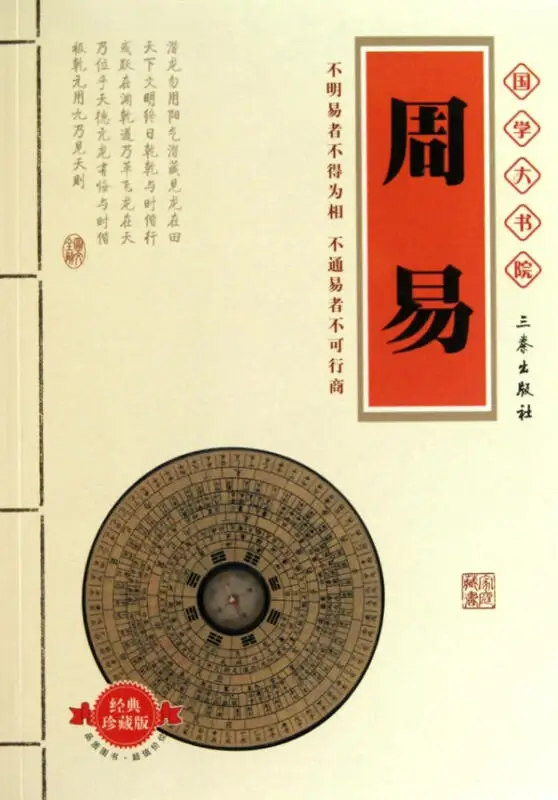The ancient origin of Chinese culture
Overview
Chinese Name:周易
English Name: The Book of Changes,Zhou Yi
Other Names: Yi Jing易经, I Ching易经
Author: Ji Chang姬昌(King Wen of Zhou周文王)
Originally Published: the Zhou Dynasty
Genre:Philosophy, Divination, Ancient Science
Brief Introduction of The Book of Changes
The Book of Changes, i.e. I Ching, is one of the traditional classics. It is said that it was written by Ji Chang, King Wen of Zhou. The content includes two parts: Jing经 and Zhuan传. The Jing is mainly composed of 64 Gua卦 and 384 Yao爻. The Gua and Yao have their own explanations (Gua Ci卦辞 and Yao Ci爻辞) for divination. Zhuan contains seven kinds of words to explain Gua Ci卦辞 and Yao Ci爻辞 , a total of ten, collectively referred to as “Ten Wings十翼”, which is said to be written by Confucius.

In the Spring and Autumn Period春秋时期, official schools began to evolve into private schools. The Yi learning developed gradually because of the mutual causes before and after the Yi learning, and a hundred schools of learning prospered, and the Yi learning differentiated accordingly. Since Confucius praised the book of changes, the book of changes has been regarded as the canon of Confucianism and the first of the six classics. In addition to Confucianism, there are two branches of Yi ology and Confucianism: one is the divination Yi that still exists in the old forces; The other is Lao Tzu’s Taoism Yi, which began to be divided into three branches.
The book of changes is the theoretical root of natural philosophy and humanistic practice in Chinese traditional thought and culture. It is the crystallization of the thought and wisdom of the ancient Han nationality. It is known as the “source of the great road”. The content is extremely rich, which has had an extremely profound impact on China’s politics, economy, culture and other fields for thousands of years.
Historical background of The Book of Changes
In the early Chinese society, due to the low productivity and underdeveloped science, the ancestors could not make a scientific explanation for natural phenomena, social phenomena and people’s own physiological phenomena. Therefore, they worshipped God and believed that there was a supreme God behind things and dominated everything in the world. When people suffer from natural and man-made disasters repeatedly, they sprout the desire to predict the sudden catastrophe and the consequences of their actions with the help of God’s will, so as to pursue advantages and avoid disadvantages. In the long-term practice, various prediction methods to communicate human and God have been invented, among which the Book of Changes, which can best reflect the divine meaning, came into being under this condition.
Author of The Book of Changes
When describing the process of the book of changes, Hanshu Yiwenzhi《汉书·艺文志》said that “the three saints have been renewed and experienced three generations人更三圣,世历三古”. Three saints, namely Fu Xi, King Wen of Zhou and Confucius. It is said that Fu Xi painted hexagrams画卦, King Wen of Zhou wrote poems写辞, and Confucius did Zhuan传. But not very reliable.

According to the research of modern academic circles, it is generally believed that the Book of Changes was written by the people of the early Zhou Dynasty. The Chong Gua重卦 was written by the King Wen of Zhou Ji Chang周文王姬昌, and the Yao Ci爻辞 was written by the Zhou Gong周公.
Excerpts of The Book of Changes
乾:元,亨,利,贞。
English Translation:The Qian symbolizes heaven: originally, prosperity, harmony and integrity.
《象》曰:天行健,君子以自强不息。
English Translation: “Xiang” said: the way of heaven runs round and round and never stops. No one can stop it. A gentleman should follow the way of heaven, stand on his own and strive constantly.
Evaluation of The Book of Changes
When it comes to the world’s only treasure book of human wisdom, the first is China’s Book of Changes. In science, the laws we get are often short-lived or overturned by later facts. Only China’s Book of Changes is ancient and new, 6000 years apart, and still has value, and has much in common with the latest atomic physics.
Carl Gustav Jung
The book of changes represents the wisdom of the Chinese people. It is a noble undertaking to find out the reason why people are human based on the graphics and images created by the human mind.
Georg Wilhelm Friedrich Hegel
The book of changes is a mysterious palace.
Guo Moruo郭沫若
You can’t be a general without reading the Book of Changes.
Yu Shinan虞世南








